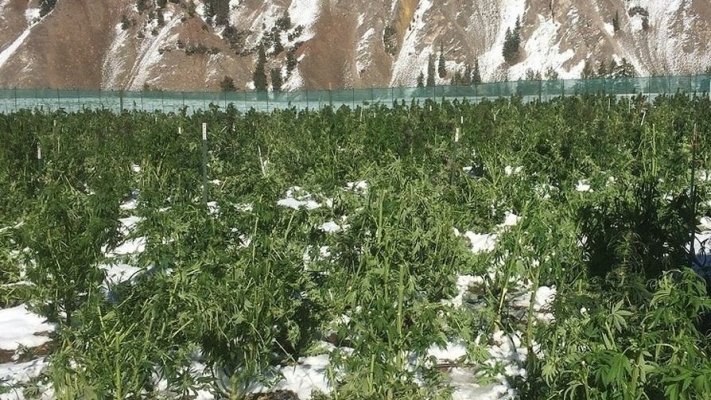Have you had ice wine? The sweet dessert wine is made from grapes frozen on the vine, requiring a large labor force to harvest the entire crop within hours after the first morning of adequately cold temperature.
Outdoor marijuana farmers in Colorado had to use the ice-wine harvesting method after an unexpected snowstorm hit much of the state last October. "We ended up having three days of freezing rain and snow last October. In that time period, we had all of our facilities filled with plants," recalls Bob DeGabrielle, CEO of Los Sueños Farms, a 36-acre cannabis farm in Pueblo County. "From a bud product prospective, we felt like we lost about $7 million last year."
When cannabis is grown outdoors, the plants are typically seeded in spring and picked in October or November. Outdoor marijuana is only harvested once a year, making the early fall months a boom-or-bust period for farmers. According to DeGabrielle, his staff usually needs five weeks to effectively harvest, dry, trim and cure the 40,000 plants at Los Sueños so that the marijuana is ready for retail sales and extraction. Last year, they had only a few days to do the job, with limited space to store the entire crop.
Employees stuck the plants in greenhouses and hoop houses on the property to get them out of the cold, but with less than two acres of combined space, DeGabrielle says that wasn't enough room to properly salvage the product.
"I know of at least one large storage facility in Pueblo that could've stored two-thirds of our harvest," he says. "There are several different options if we could use industrial and farm property [for storage] and ensure there would be adequate security."
But Los Sueños isn't allowed to move plants off the property during weather emergencies, DeGabrielle says, because of state laws that mandate that commercial marijuana stay on the licensed property at which it's grown until the plants are sold for extraction or a dispensary's inventory. Since unpredictable bad weather can hit Colorado during the fall harvest season, DeGabrielle would like a new rule that allows contingency plans for pot farmers in case of such emergencies.
"We talk to the local weather station daily. In cases of emergency or acts of God, we'd like the flexibility to be able to move this," he explains. "At least then we'd still have dry product."
Los Sueños is far from the only outdoor cannabis growing operation in southern Colorado, much less the state. Pot-Zero, an outdoor marijuana farm in Eagle County with many fewer plants and employees, received ten inches of snow on an October night in 2017. To save the 5,000-plus plants, Pot-Zero's owners, Rob and Linda Trotter, had to scramble to find short-term labor in a matter of hours, but anyone working at a licensed pot business in Colorado must have a badge of approval from the MED. In less-populated areas like Eagle County, finding badged employees on short notice can be difficult; the Trotters were eventually able to get some neighboring friends licensed by the MED to help them with the last-minute harvest.
DeGabrielle says he's approached lawmakers in hopes of updating the state Marijuana Enforcement Division's rules to give pot farmers more protection in case of harsh weather; so far, a few have listened, with a new bill in the state House of Representatives that would require the MED to create regulations allowing outdoor marijuana growers to make contingency plans when extreme weather threatens their plants.
Introduced by Representative Alex Valdez, House Bill 1328 currently has four sponsors. Valdez says he hasn't spoken with the MED about the proposal yet, but he's been meeting with marijuana stakeholders and believes he'll get enough support to push the measure through this year.
"Colorado is very prone to hail and other severe weather events," Valdez says. "We need it so [farmers] don't see their crops wiped out overnight. That can hit deep."
Valdez's bill is light on details of how these plans would work — he says the MED and industry stakeholders would create most of those regulations through rulemaking — but he and DeGabrielle believe transportation, storage and security are the most important factors to consider.
"There are still these areas we may not have thought of that we need to address, to make sure the cannabis business is sustainable," Valdez says. "It's essentially just expanding the [MED's] authority to create rules in how to handle this. It's pretty straightforward."
The MED declined to comment on the proposal, but is likely to testify during the bill's first committee hearing on March 12.
Outdoor marijuana farmers in Colorado had to use the ice-wine harvesting method after an unexpected snowstorm hit much of the state last October. "We ended up having three days of freezing rain and snow last October. In that time period, we had all of our facilities filled with plants," recalls Bob DeGabrielle, CEO of Los Sueños Farms, a 36-acre cannabis farm in Pueblo County. "From a bud product prospective, we felt like we lost about $7 million last year."
When cannabis is grown outdoors, the plants are typically seeded in spring and picked in October or November. Outdoor marijuana is only harvested once a year, making the early fall months a boom-or-bust period for farmers. According to DeGabrielle, his staff usually needs five weeks to effectively harvest, dry, trim and cure the 40,000 plants at Los Sueños so that the marijuana is ready for retail sales and extraction. Last year, they had only a few days to do the job, with limited space to store the entire crop.
Employees stuck the plants in greenhouses and hoop houses on the property to get them out of the cold, but with less than two acres of combined space, DeGabrielle says that wasn't enough room to properly salvage the product.
"I know of at least one large storage facility in Pueblo that could've stored two-thirds of our harvest," he says. "There are several different options if we could use industrial and farm property [for storage] and ensure there would be adequate security."
But Los Sueños isn't allowed to move plants off the property during weather emergencies, DeGabrielle says, because of state laws that mandate that commercial marijuana stay on the licensed property at which it's grown until the plants are sold for extraction or a dispensary's inventory. Since unpredictable bad weather can hit Colorado during the fall harvest season, DeGabrielle would like a new rule that allows contingency plans for pot farmers in case of such emergencies.
"We talk to the local weather station daily. In cases of emergency or acts of God, we'd like the flexibility to be able to move this," he explains. "At least then we'd still have dry product."
Los Sueños is far from the only outdoor cannabis growing operation in southern Colorado, much less the state. Pot-Zero, an outdoor marijuana farm in Eagle County with many fewer plants and employees, received ten inches of snow on an October night in 2017. To save the 5,000-plus plants, Pot-Zero's owners, Rob and Linda Trotter, had to scramble to find short-term labor in a matter of hours, but anyone working at a licensed pot business in Colorado must have a badge of approval from the MED. In less-populated areas like Eagle County, finding badged employees on short notice can be difficult; the Trotters were eventually able to get some neighboring friends licensed by the MED to help them with the last-minute harvest.
DeGabrielle says he's approached lawmakers in hopes of updating the state Marijuana Enforcement Division's rules to give pot farmers more protection in case of harsh weather; so far, a few have listened, with a new bill in the state House of Representatives that would require the MED to create regulations allowing outdoor marijuana growers to make contingency plans when extreme weather threatens their plants.
Introduced by Representative Alex Valdez, House Bill 1328 currently has four sponsors. Valdez says he hasn't spoken with the MED about the proposal yet, but he's been meeting with marijuana stakeholders and believes he'll get enough support to push the measure through this year.
"Colorado is very prone to hail and other severe weather events," Valdez says. "We need it so [farmers] don't see their crops wiped out overnight. That can hit deep."
Valdez's bill is light on details of how these plans would work — he says the MED and industry stakeholders would create most of those regulations through rulemaking — but he and DeGabrielle believe transportation, storage and security are the most important factors to consider.
"There are still these areas we may not have thought of that we need to address, to make sure the cannabis business is sustainable," Valdez says. "It's essentially just expanding the [MED's] authority to create rules in how to handle this. It's pretty straightforward."
The MED declined to comment on the proposal, but is likely to testify during the bill's first committee hearing on March 12.




